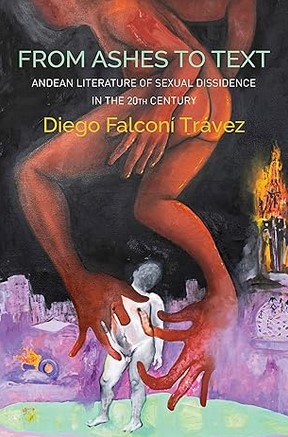Diego Falconí Trávez (Quito, 1979) is an Ecuadorian lawyer, scholar, and writer specializing in human rights, literary theory, and comparative literature. He is an associate professor at the Universitat Autònoma de Barcelona and a researcher at the Universidad San Francisco de Quito, where he also directs the legal journal Iuris Dictio. His research explores gender studies, queer theory, Andean literature, and the intersections of law and literature. Falconí is best known for his book De las cenizas al texto: Literaturas andinas de las disidencias sexuales en el siglo XX, which won the prestigious Casa de las Américas Prize in 2016, and for his advocacy for decolonial and dissident identities in cultural and academic discourse.
Early Life and Education
Diego Falconí Trávez was born in 1979 in Quito, Ecuador. He pursued his higher education at the Universidad San Francisco de Quito, where he earned degrees in Liberal Arts and Law with a specialization in human rights, particularly focusing on gender and LGBTQ+ perspectives. He furthered his academic journey by obtaining a Ph.D. in Literary Theory and Comparative Literature from the Universitat Autònoma de Barcelona in 2011. His doctoral thesis would later serve as the foundation for his award-winning book, De las cenizas al texto.
Academic and Professional Career
Falconí has established himself as an influential scholar and educator. He is an associate professor of Literary Theory at the Universitat Autònoma de Barcelona and a researcher and faculty member at the School of Law of the Universidad San Francisco de Quito. At the latter institution, he also serves as the editor-in-chief of the legal journal Iuris Dictio and co-directs the research group Intertextos, which explores the intersections between law and literature.
His research spans a diverse array of fields, including gender studies, queer theory, Andean studies, and decolonial approaches to literature and culture. He also focuses on the intersections between law and normativity, particularly within the context of Latin American cultures.
Literary Contributions and Themes
Falconí’s writings are characterized by their critical examination of marginalized identities, decoloniality, and the reconstruction of cultural and literary narratives in Latin America. His monograph De las cenizas al texto: Literaturas andinas de las disidencias sexuales en el siglo XX earned him the prestigious Casa de las Américas Prize in 2016. The book provides a critical and nuanced reading of Andean literature through the lens of sexual dissidence, analyzing authors such as Pablo Palacio, Fernando Vallejo, Julieta Paredes, Jaime Bayly, and Adalberto Ortiz. The jury praised Falconí for his prose style and his deep analysis of the selected texts and authors.
In 2018, he edited Inflexión Marica: Escrituras del descalabro gay en América Latina, a compilation of essays addressing LGBTQ+ identities and sexual diversity in Latin America. This book was later highlighted by El Universo in 2022 as an essential LGBT work by an Ecuadorian author.
Selected Works
- Las entrañas del sujeto jurídico: Un diálogo entre la literatura y el derecho (2012)
- De las cenizas al texto: Literaturas andinas de las disidencias sexuales en el siglo XX (2016)
As editor:
- Me fui a volver: Narrativas, autorías y lecturas teorizadas de las migraciones ecuatorianas (2014)
- A medio camino: Intertextos entre la literatura y el derecho (2016)
- Inflexión Marica: Escrituras del descalabro gay en América Latina (2018)

Falconí’s seminal book De las cenizas al texto was translated into English as From Ashes to Text: Andean Literature of Sexual Dissidence in the 20th Century. In this work, Falconí introduces a framework for understanding dissident identities in Andean literature through theoretical lenses such as anticoloniality, feminism, and cuir theory (a Latin American adaptation of queer theory emphasizing decolonial and regional perspectives on gender and sexuality).
Personal Life and Advocacy
Falconí is openly homosexual and has been an outspoken advocate for reclaiming terms such as “maricón” to counteract the classist and colonialist connotations he associates with terms like “gay.” His activism aligns with his scholarly work, particularly in challenging dominant cisheteropatriarchal and colonial paradigms in literature and society.
Legacy and Recognition
Diego Falconí’s work is recognized for its intellectual rigor and its contributions to queer theory, decolonial studies, and Andean cultural analysis. By reimagining how marginalized identities are represented in literature and law, he has carved a unique space in academic and cultural discourse, earning international accolades for his contributions.
Through his teaching, research, and publications, Falconí continues to influence debates on gender, sexuality, and decoloniality in the Global South, while amplifying voices often excluded from dominant narratives. His works remain vital resources for understanding the intersections of literature, culture, and human rights.
References
- Wikipedia. Diego Falconí Trávez. Retrieved on December 24, 2024. Click to view.
- Universidad San Francisco de Quito. Diego Falconí Trávez – Faculty Profile. Retrieved on December 24, 2024. Click to view.
- Portal de Recerca Universitat Autònoma de Barcelona. Diego Falconí Trávez – Research Profile. Retrieved on December 24, 2024. Click to view.
- Centro de Cultura Contemporánea de Barcelona. Diego Falconí Trávez – Biography. Retrieved on December 24, 2024. Click to view.
- Editorial Egales. Inflexión Marica: Escrituras del descalabro gay en América Latina. Retrieved on December 24, 2024. Click to view.
- Polity Books. From Ashes to Text: Andean Literature of Sexual Dissidence in the 20th Century. Retrieved on December 24, 2024. Click to view.
- Universidad Andina Simón Bolívar. Diego Falconí Travez gana Premio Literario Casa de las Américas 2016. Retrieved on December 24, 2024. Click to view.
Image source
- Universidad San Francisco de Quito. Diego Falconí Trávez – Profile Page. Retrieved on December 24, 2024. Image source.

